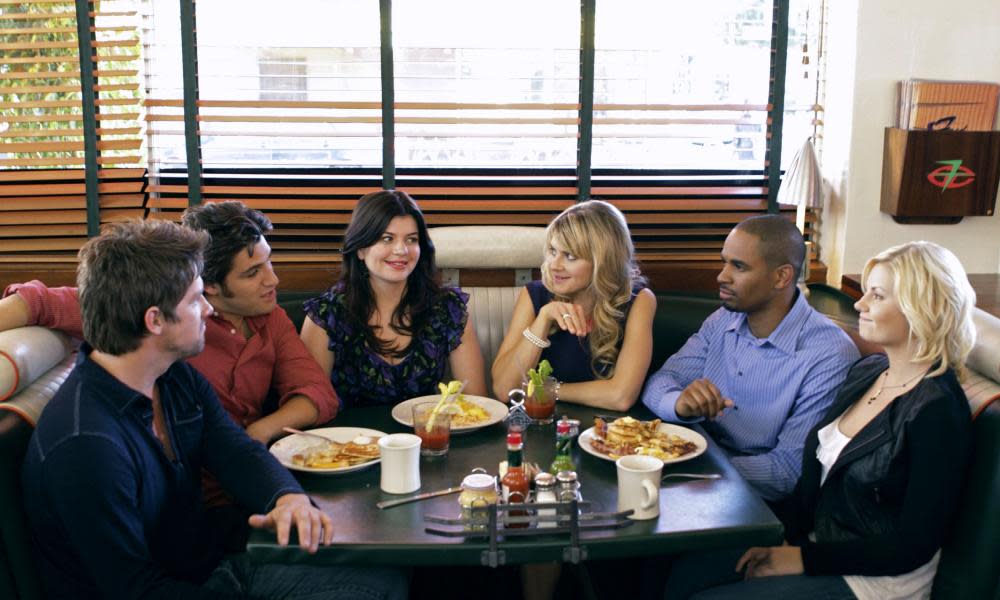Happy Endings: the other sitcom about six friends that never got the love it deserved

If I were to describe one of my all-time favourite sitcoms as The One with a Group of Six Tight-Knit Friends, you’d probably presume I also enjoy giant mugs of coffee at Central Perk. It’s unlikely you’d immediately think of Happy Endings.
For a show that’s always the sitcom-bridesmaid but never really the sitcom-bride, it’s fitting that Happy Endings starts with Alex (Elisha Cuthbert) leaving Dave (Zachary Knighton) at the altar for a shirtless man in skates.
In addition to Alex and Dave, the Chicago-based six include: the wonderfully cynical and dysfunctional Max (Adam Pally) – dubbed by one commentator as “TV’s most important gay character” – the hopelessly single but endlessly hopeful Penny (Casey Wilson), and married duo Brad (Damon Wayans Jr) and Jane (Eliza Coupe), who were “couple goals” before it became a marketing trend with a specific font.
Related: Evil: whip-smart, campy horror series is far more than X-Files knock-off
Created a decade ago by David Capse, Happy Endings, like most marriages, was sadly short-lived, lasting only three seasons before being cancelled in 2013. As Wilson puts it in her memoir (a must-read): “You have either seen Happy Endings and love it beyond measure … or you’ve simply never heard of it.”
Released in the era of romcom sitcoms like New Girl and The Mindy Project, it’s easy to misinterpret Happy Endings from the outside. Sure, it starts with failed nuptials and wraps each season at a wedding, but don’t let that fool you. The central relationship of the show is not a will they, won’t they between Alex and Dave, it’s the one between the friends.
And so we must address the elephant in the cafe. The comparison between Happy Endings and Friends was inevitable from the start. Capse referenced it in interviews and in the show itself when Brad, high on “goof juice” after a dentist appointment, points to each of his pals announcing their corresponding archetype: Jane/Monica, Dave/Ross, Alex/Rachel, Penny/Phoebe, Max/Joey and Brad/Chandler. After all, Happy Endings is a hangout ensemble sitcom; it features a sibling pair (Alex and Jane are the Kerkovich sisters) and a runaway bride. But the differences extend beyond style (no laugh track, single-camera), generation and of course popularity.
The joke density in each episode of Happy Endings is intense and rapid-fire, and the writing is endlessly funny and often verges into the absurd. It’s almost impossible to pick standout episodes and characters. Personally I love Penny and Max, because at the time I first watched the series I was “a Penny” to “a Max” … but we didn’t wear mummy-baby costumes for Halloween (Google it).
Coupe and Wayans are comedic geniuses in their roles as Jane and Brad; their chemistry crackles and demands attention (much like the pet teacup pig Brad brings into Jane’s work at the Car Czar dealership). You might initially feel like piling on Dave because it’s what the gang do, but he is a key player. He and his food truck, Steak Me Home Tonight, provide some serious laughs. As Penny says in season three: “Dave, for a leading man type, you’ve partaken in some really outlandish behaviour.” Even seemingly incompatible characters, Brad and Alex, share unforgettable screen time in classic episodes dedicated to this incompatibility, only to find common ground in romcoms (and romcom con).
Happy Endings isn’t overrun by schmaltz or cynicism, but strikes the perfect balance between the two. But sadly it couldn’t find the audience it needed to survive. And even in our modern world of streaming, it’s struggled to reach the cult status of, say, Arrested Development. So unlike practically everything else, the series yet to be revived (beyond the bonus “pandemmy” Zoom-hangout episode filmed for charity and that is now on YouTube).
Internationally, it’s finally getting some recognition, having recently moved to Netflix US. In the era of Schitt’s Creek, Happy Endings fits right in, deserving the accolades and potential renewal that comes with the celebrated Netflix bump.
Shamefully, it’s been shuffled around a bit for Australian streamers. Last year it was available on SBS On Demand but has since been moved solely to iTunes.
It is more than worth seeking out. There are only 57 episodes, which is around 20 hours of streaming time. That’s 20 hours of laughs, with memorable one-liners that I rewatch like a besotted bride revisits her wedding tapes.
In a world full of reboots, remakes and lukewarm reheatings, this is the one show I would truly be happy to see come back. So I’m here, getting down on one knee, proposing that you, potential viewer, watch Happy Endings wherever you can.


